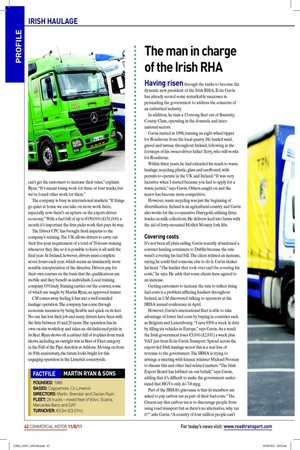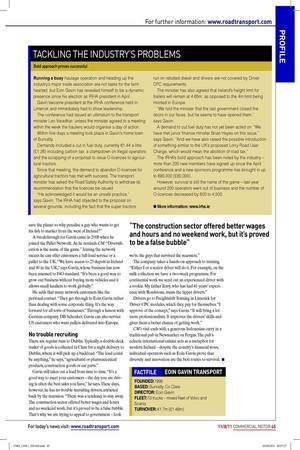The man in charge of the Irish RHA
Page 37

Page 40

If you've noticed an error in this article please click here to report it so we can fix it.
Having risen through the ranks to become the dynamic new president of the Irish RHA, Eoin Gavin has already scored some remarkable successes in persuading the government to address the concerns of an embattled industry.
In addition, he runs a 13-strong leet out of Bunratty, County Clare, operating in the domestic and international sectors.
Gavin started in 1998, running an eight-wheel tipper for Roadstone from the local quarry. He hauled sand, gravel and tarmac throughout Ireland, following in the footsteps of his owner-driver father Terry, who still works for Roadstone.
Within three years, he had extended his reach to waste haulage; recycling, plastic, glass and cardboard, with permits to operate in the UK and Ireland. “It was very lucrative when I started because you had to apply for a waste permit,” says Gavin. Others caught on and the sector has become more competitive.
However, waste recycling was just the beginning of diversiication. Ireland is an agricultural country and Gavin also works for the co-operative Dairygold, utilising three trucks on milk collections. He delivers feed into farms with the aid of lorry-mounted Moffett Mounty fork lifts.
Covering costs
It’s not been all plain sailing. Gavin recently abandoned a contract hauling containers to Dublin because the rate wasn’t covering his fuel bill. The client refused an increase, saying he could ind someone else to do it. Gavin shakes his head. “The haulier that took over can’t be covering his costs,” he says. He adds that some clients have agreed to an increase.
Getting customers to increase the rate to relect rising fuel costs is a problem aflicting hauliers throughout Ireland, as CM discovered talking to operators at the IRHA annual conference in April.
However, Gavin’s international leet is able to take advantage of lower fuel costs by buying in countries such as Belgium and Luxembourg. “I save €500 a week in duty by illing six vehicles in Europe,” says Gavin. As a result the Irish government loses €3,000 (£2,631) a week plus VAT just from Eoin Gavin Transport. Spread across the export-led Irish haulage sector this is a real loss of revenue to the government. The IRHA is trying to arrange a meeting with inance minister Michael Noonan to discuss this and other fuel-related matters. “The Irish Export Board has lobbied on our behalf,” says Gavin, adding that it’s dificult to make the government understand that HGVs only do 7-8 mpg.
Part of the IRHA’s grievance is that its members are asked to pay carbon tax as part of their fuel costs. “The Greens say that carbon tax is to discourage people from using road transport but as there’s no alternative, why tax it?” asks Gavin. “A country of four million people can’t save the planet so why penalise a guy who wants to get his ish to market from the west of Ireland?”
A breakthrough for Gavin came in 2008 when he joined the Pallet Network. As he reminds CM: “Diversiication is the name of the game.” Joining the network means he can offer customers a full-load service or a pallet to the UK. “We have access to 23 depots in Ireland and 90 in the UK,” says Gavin, whose business has now been assessed to ISO standard. “It’s been a good way to grow our business without buying more vehicles and it allows small hauliers to work globally.”
He adds that many network customers like the personal contact. “They get through to Eoin Gavin rather than dealing with some corporate thing. It’s the way forward for all sorts of businesses.” Through a liaison with German company DB Schenker, Gavin can also service US customers who want pallets delivered into Europe.
No trouble recruiting
There are regular runs to Dublin. Typically, a double-deck trailer of goods is collected in Clare for a night delivery to Dublin, where it will pick up a backload. “The load could be anything,” he says, “agricultural or pharmaceutical products, construction goods or car parts.” Gavin still takes out a load from time to time. “It’s a good way to meet your customers – the day you are driving is often the best sales you have,” he says. These days, however, he has no trouble recruiting drivers, attracted back by the recession. “There was a tendency to stay away. The construction sector offered better wages and hours and no weekend work, but it’s proved to be a false bubble. That’s why we are trying to appeal to government – look we’re the guys that survived the recession.” The company takes a hands-on approach to training. “Either I or a senior driver will do it. For example, on the milk collection we have a two-week programme. For continental work we send out an experienced driver with a rookie. My father Terry, who has had 41 years’ experience with Roadstone, trains the tipper drivers.” Drivers go to Freightshift Training in Limerick for Driver CPC modules, which they pay for themselves. “I approve of the concept,” says Gavin. “It will bring a lot more professionalism. It improves the drivers’ skills and gives them a better chance of getting work.”
CM’s visit ends with a generous Indonesian curry in a traditional pub in Newmarket on Fergus. The pub’s eclectic international cuisine acts as a metaphor for modern Ireland – despite the country’s inancial woes, individual operators such as Eoin Gavin prove that diversity and innovation are the best routes to survival. ■














































